|
|
|
Sort Order |
|
|
|
Items / Page
|
|
|
|
|
|
|
| Srl | Item |
| 1 |
ID:
114333
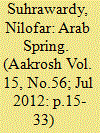

|
|
|
| 2 |
ID:
118661
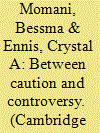

|
|
|
|
|
| Publication |
2012.
|
| Summary/Abstract |
The history of Gulf donorship, its trajectory and underlying motivations, continues to be an understudied aspect of foreign aid. While the Gulf Arab states are not new donors, their manner of regional coordination, branding, and aid management are distinct. Often helping fellow countries of the South, particularly Arab and Muslim countries, these countries have moved towards stronger private sector involvement and into social spending programmes. Owing to their oil wealth, Gulf Arab states' are increasingly generous and yet they are also cautious after 9/11 about how and by whom their aid is channelled. Nevertheless, with oscillations in oil prices, continued controversy over rising Islamism post-Arab-Spring, the future of Gulf aid remains a valuable subject of study.
|
|
|
|
|
|
|
|
|
|
|
|
|
|
|
|
| 3 |
ID:
125449
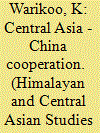

|
|
|
|
|
| Publication |
2013.
|
| Summary/Abstract |
China considers herself to be an important player in the new geopolitics of Central Asia not only because it shares nearly 3000 Kms. of it strategic frontiers in Xingjian with the Central Asian states of Kazakhstan, Kyrgyzstan and Tajikistan, but also due to cross border fraternization of Muslim population inhabiting this area, which makes borders vulnerable to ethnic religious separatism.
|
|
|
|
|
|
|
|
|
|
|
|
|
|
|
|
| 4 |
ID:
121060
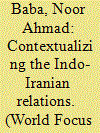

|
|
|
|
|
| Publication |
2013.
|
| Summary/Abstract |
The Islamic revolution in Iran during 1978-79 resulted in bringing about a fundamental change in the Iranian foreign policy orientation that had a positive bearing on the indo-Iranian relationship. To reinforce this relationship the two countries began to discover and emphasize a number of commonalities between the two in history and in contemporary times. In this context while as Pakistan continued to be pro-west and the US partner in anti-Soviet war in Afghanistan, Iran gained greater proximity with India as a member of non- aligned community. In the changed context Iran became weary of the OIC and its activities. This indifference towards OIC and many of its conservatively oriented concerns was reinforced by Iraq-Iran war that polarized the Muslim countries.
|
|
|
|
|
|
|
|
|
|
|
|
|
|
|
|
| 5 |
ID:
127058
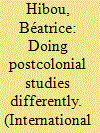

|
|
|
|
|
| Publication |
2013.
|
| Summary/Abstract |
Mohamed Tozy is certainly one of the better known Moroccan intellectuals in the Arab world and in Europe, in particular for his publication of the book Monarchie et islam politique au Maroc (Monarchy and Political Islam in Morocco) which is a classic in social sciences and political studies.2 He is a Professor at the Institute of Political Science (Institut d'Etudes Politiques, IEP) in Aix-en-Provence and at the Hassan II University in Casablanca and also a researcher at LAMES (LAboratoire MEditerranéen de Sociologie) of the Maison Méditerranéenne de Sciences Humaines d'Aix-Marseille as well as at CHERPA (Croyance, Histoire, Espace, Régulation Politique et Administrative). In 2005, he set up the Centre Marocain des Sciences Sociales (CM2S), which is the first one of its kind in social sciences in Morocco to have included a doctoral school. He is presently in the process of setting up a faculty for social sciences at the Mohamed VI polytechnic University
|
|
|
|
|
|
|
|
|
|
|
|
|
|
|
|
| 6 |
ID:
137160
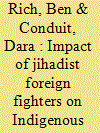

|
|
|
|
|
| Summary/Abstract |
Jihadist foreign fighters have become common in civil conflicts in Muslim countries. While research exists on the impact they have upon returning home, less attention has been given to their influence on the opposition cause that they mobilize in support of. This article looks at the impact that jihadist foreign fighters on the Chechen and Syrian resistance causes, evaluating their influence on oppositional cohesion and ideology, domestic and international perceptions of the movements, and on governmental narratives regarding the conflicts the foreign fighters engage in. It is concluded that foreign fighters have overwhelmingly damaged the Chechen and Syrian opposition movements, making the likelihood of opposition success more remote.
|
|
|
|
|
|
|
|
|
|
|
|
|
|
|
|
| 7 |
ID:
169982
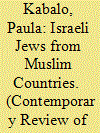

|
|
|
|
|
| Summary/Abstract |
This article sheds light on the salient and far-reaching pattern of association-forming among Jewish immigrants from Muslim countries in Israel during the 1950s and 1960s. They were formally established associations that operated by means of representatives and spokespersons and strove to mediate between the population group that they represented and the state authorities that dealt with immigration and its integration. Interestingly, although few of the members or leaders of these entities have lived under democratic regimes, they established organizations that operated on the basis of democratic principles: election of representatives, holding members’ assemblies, and freedom of expression. They articulated their positions publicly and openly and were not deterred from criticizing policymakers, even those in the highest of echelons.
|
|
|
|
|
|
|
|
|
|
|
|
|
|
|
|
| 8 |
ID:
089283
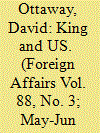

|
|
|
|
|
| Publication |
2009.
|
| Summary/Abstract |
As World War II was drawing to a close in February 1945, U.S. President Franklin Roosevelt and Saudi King Abdul Aziz ibn Saud met aboard a U.S. battleship in the Suez Canal for the first time. For nearly six decades afterward, the United States and the Kingdom of Saudi Arabia enjoyed an unusually close relationship. U.S. companies, which had discovered black gold in the Saudi desert in the early 1930s, built the kingdom into the world's leading petroleum exporter and a major source of oil for the U.S. market. The Saudis, in turn, made their territory and military facilities available to U.S. forces in order to assure U.S. protection of the House of Saud.
|
|
|
|
|
|
|
|
|
|
|
|
|
|
|
|
| 9 |
ID:
105025
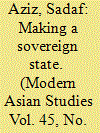

|
|
|
|
|
| Publication |
2011.
|
| Summary/Abstract |
This paper takes a critical look at a recent attempt by the Pakistani state to manage religious thought and practice, under the broad banner of 'Enlightened Moderation'. One of the key Islamic thinkers associated in popular imagination with this project is Javed Ahmed Ghamidi. In contextualizing the work and role of Ghamidi, it is tempting to work backwards from his opinions on Islamic truth to situate him as a reformer whose interventions are primarily oriented to the task of reconciling Islam to conditions of liberal modernity. Against such a tendency it is argued here that such an exercise of classification and categorization needs to be undertaken with greater care as against a critique of the imperialist typology of 'good' and 'bad' Islams, a project of delineating authentic from inauthentic Islams has also more recently been activated.
|
|
|
|
|
|
|
|
|
|
|
|
|
|
|
|
| 10 |
ID:
080428
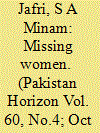

|
|
|
| 11 |
ID:
119447
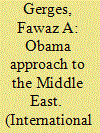

|
|
|
|
|
| Publication |
2013.
|
| Summary/Abstract |
As Obama begins his second presidential term, this article takes stock of his foreign policy approach towards the Middle East. It lays out four big arguments.
First, Obama's foreign policy in the Middle East has demonstrated more continuity with the past than real change. While shifting his approach significantly from Bush's, Obama has adopted a centrist-realist approach towards the region, consistent with the dominant US foreign policy orientation.
Second, from Palestinian-Israeli peace to Afghanistan, Obama's conduct testifies to the structural-institutional continuity of US foreign policy. More than in any other region in the world, presidential policy in the Middle East is hampered by institutional, bureaucratic and domestic politics. America's dysfunctional political culture has imposed severe constraints on Obama's ability to pursue an even-handed approach towards the enduring and preeminent Palestine question.
Third, despite Obama's lofty rhetoric about a new start in relations between the United States and Muslim countries, the Middle East does not rank very high on his agenda. Putting America's fiscal house in order and renewing its long-term economic strength have been Obama's priorities. From the outset, Obama has been shifting US foreign policy priorities away from the Middle East to the Pacific and Asia where he and his aides believe that America's future lies.
Finally, the article argues that the US finds itself in a similar position to that of Great Britain after the Second World War, at the beginning of the end of its hegemonic moment in the Middle East. The end of American hegemony in the region stems from internal and external causes, including an awakened public opinion in the Middle East, the emergence of geostrategic and geo-economic regional powers with assertive foreign policies, America's relative economic decline and the high costs of war, and the shift in US foreign policy priorities to the Asia-Pacific region.
|
|
|
|
|
|
|
|
|
|
|
|
|
|
|
|
| 12 |
ID:
091416
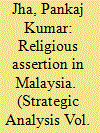

|
|
|
|
|
| Publication |
2009.
|
| Summary/Abstract |
For several decades, religion has been a visible and potent force in the domestic politics of Muslim countries. Within Asia, the issue has attracted considerable debate and a good case study of this is Malaysia. Issues of religious conversion, demolition of temples, apostasy, and Islamic state discourse have widened fault lines among different religious communities in Malaysia. While on the one hand the role of the state is seen as being a constraining factor to these divisive tendencies, on the other hand politico-social compulsions have coerced it into acceding to the majoritarian demands. The opposition Islamic political parties and the contradicting interpretations of the constitution and religious texts have aggravated the problem. The global financial crisis has further accentuated the fissures and minority protagonists of majority religious groups have become more assertive.
|
|
|
|
|
|
|
|
|
|
|
|
|
|
|
|
| 13 |
ID:
129229
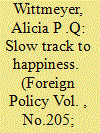

|
|
|
|
|
| Publication |
2014.
|
| Summary/Abstract |
Anyone who has been in a Muslim country during Ramadan knows the transformation that comes about with the first sighting of the crescent moon. During the holy month, the devout fast from sunrise to sunset. Bustling thoroughfares go quiet; office hours are shorter to accommodate fasting employees; and business grinds to a halt, to the frustration of expats and foreign partners. Now, a new paper from two Harvard University researchers confirms what until now has only been a nagging suspicion: Religion isn't good for the economy. Economists Filipe Campante and David Yanagizawa-Drott examined data from every Ramadan since 1950, using the amount of time spent fasting as a measure for intensity of religious practice. Focusing on countries that were more than 75 percent Muslim, they found that when people spent more time fasting -- when Ramadan fell during the long days of summer, for instance -- it took a bigger toll on economic growth. Increasing the average daily fast in a country from 12 to 13 hours, for example, decreased GDP growth by about 0.7 percentage points, the authors found. More-intense religious ractice, in other words, left worshippers poorer. And being poorer makes you less happy, right?
|
|
|
|
|
|
|
|
|
|
|
|
|
|
|
|
| 14 |
ID:
116890
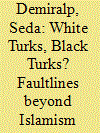

|
|
|
|
|
| Publication |
2012.
|
| Summary/Abstract |
According to popular views, contemporary Turkish politics is defined by the ideological conflict between Islamist and secularist parties. However, the focus on the Islamism versus secularism dichotomy, a common bias in the studies of Muslim countries, disguises a deeper faultline between the old urban elites and the newly rising provincial actors. This article highlights the need to see beyond the 'Islamism-secularism' divide and to consider the complex relations of power between alienated social groups in Turkey. It analyses the intricate and multi-layered forms of 'othering' in the urban secularist discourse, which perpetuates the inequalities and contention in society. Instead of taking the 'Islamism-secularism' divide as given, the article analyses the construction of secularist and Islamic identities and considers how this dichotomous discourse has empowered the urban parties to control the provincial. Finally, implications for the reconciliation of antagonised social groups are presented.
|
|
|
|
|
|
|
|
|
|
|
|
|
|
|
|
| 15 |
ID:
068336
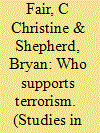

|
|
|
| 16 |
ID:
114470
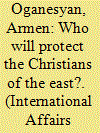

|
|
|
|
|
| Publication |
2012.
|
| Summary/Abstract |
OVER THE PAST SEVEN YEARS, the number of physical reprisals and terrorist acts against Christians in Africa, Asia, and the Middle East has increased by 309%.
The Arab Spring has added momentum to this process, causing it to snowball. By the end of last year, 200,000 Copts had left their homes to escape the repressions of the new Egyptian authorities. Notwithstanding the NATO contingents deployed in the country, the reprisals aimed against Christians in Iraq have reduced their numbers from one million to less than 500,000. According to UN data, in South Sudan, in spite of the world community's intermediation, between 53,000 and 75,000 people have been forced to leave their historical place of residence. Furthermore, they, like thousands of other Christian refugees from the East, have little chance of returning - their homes are being torn down and plundered.
|
|
|
|
|
|
|
|
|
|
|
|
|
|
|
|
| 17 |
ID:
124365
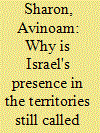

|
|
|
|
|
| Publication |
2011.
|
| Summary/Abstract |
The term "occupation" is often employed politically, without regard for its general or legal meaning. The use of the term "occupation" in political rhetoric reduces complex situations of competing claims and rights to predefined categories of right and wrong. Iraq was occupied by the Coalition forces from the spring of 2003 until June 28,2004, at which time authority was handed over to the Iraqi Interim Government. At that point, Coalition forces remained in Iraq, but Iraq was no longer deemed occupied. If handing over authority to a Coalition-appointed interim government ended the occupation of Iraq, would the same not hold true for the establishment of the Palestinian Authority and Israel?
|
|
|
|
|
|
|
|
|
|
|
|
|
|
|
|
|
|
|
|
|